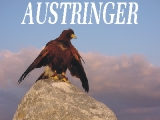
Falconry
The Mews
Falconry
Falconry
Jargon
Falconry
Gallery
Links
Opinion
Feedback
Rusty's Page
The practice of falconry in the modern era seems to many an anachronism. However, the care of raptors and interaction with hunting with a skilled predator provides many insights into animal behavior not otherwise available to the biologist.
Falconry is regulated under both federal and state laws. All raptors in the USA are protected under various statutes; any "take" of a raptor must be done under the appropriate permit to be legal. This includes the possession of raptor feathers. (Actually, the possession of any feathers from migratory birds is illegal without the right permits, which has cost several artists fines and confiscation of works which incorporated feathers.)
If you are interested in falconry, the probable best first contact is
the state agency which regulates wildlife or hunting in your own state.
Request information on falconry, and you should receive the relevant state
and federal statutes and requirements, and some states also distribute
lists of currently permitted falconers in the state.
Raptors - what are they?
Raptors are predatory birds of the families Falconiformes and Strigiformes, including the falcons, hawks, kites, eagles, condors, vultures, and owls.Commonly seen raptors of the USA include the Red-Tailed Hawk, a large buteoine hawk (Buteo jamaicaensis). This is also a popular bird for falconry, due to its wide availability, ease of training, and the fact that many states require apprentices to start with birds from a short list including the red-tailed hawk.
Another commonly seen raptor is the American Kestrel (Falco sparverius), a small falcon "about the size of a jay". The American Kestrel is distinctive in its flight, often employing a hovering flight to scan fields for insects and mice.
A native of the southeastern US and California, the Red-Shouldered
Hawk is smaller than than Red-Tailed Hawk, and somewhat more
reclusive. Their prey items range from grasshoppers up to small
rabbits.